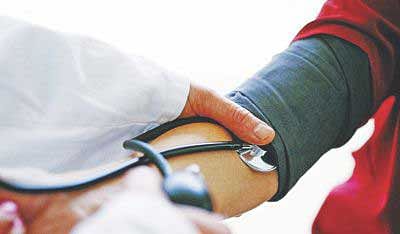Managing hypertension, a rising concern

Bangladesh is going through demographic and health transitions, resulting in change in the age structure of its population and rise of noncommunicable (NCD) diseases like heart diseases, diabetes, cancers, lung diseases etc. Cardiovascular disease has become the top most cause of deaths in Bangladesh and hypertension (HTN) or high blood pressure is the most important risk factor behind it.
Recently conducted NCD Risk factor survey 2010 by the Government of Bangladesh on a nationally representative sample reported prevalence of HTN as 17.9% among the adults aged 25 years or more. This survey estimated that about 12 million people in Bangladesh (6.2 million men and 5.8 million women) are hypertensive. Around one third of the respondents in the survey (32.9%) never measured their blood pressure which signifies a huge number of people are living with HTN — a silent epidemic.
Reducing blood pressure (BP) can decrease cardiovascular risks and this can be achieved by lifestyle measures as well as with the medication of cost-effective drugs.
Lifestyle changes should be the initial approach to HTN management and it include dietary interventions (reducing salt, increasing Potassium, alcohol avoidance and diet control), weight reduction, tobacco cessation, physical exercise and stress management.
Dietary Approaches to Stop Hypertension (DASH) study showed that a diet low in sodium (less 1500 mg per day or around half teaspoon per day) and high in Potassium rich fruits, vegetables and calcium is helpful in treating HTN.
Exercise is critically important, especially in children and young adults with HTN. Being overweight increases the chances of developing high blood pressure. A body mass index (BMI) between 25 and 30 is considered overweight. Losing as little as 10 to 20 pounds can help lower blood pressure and heart disease risk.
To successfully and healthfully lose weight — and keep it off — most people need to subtract about 500 calories per day from their diet to lose about 1 pound per week or a combined approach of physical exercise and diet restriction. Giving up smoking and managing stress will also help lower BP.
If lifestyle measures are not enough to lower BP, consult a physician for drug therapy combined with comprehensive management.
Optimal blood pressure is less than 120/80 mm Hg. Starting at age 20, we should have a blood pressure screening at healthcare visit or once every 2 years, if your blood pressure is less than 120/80 mm Hg.

 For all latest news, follow The Daily Star's Google News channel.
For all latest news, follow The Daily Star's Google News channel. 



Comments